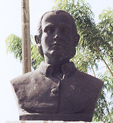Antonio de los Reyes Correa
Antonio de los Reyes Correa | |
|---|---|
 Capt. Antonio de los Reyes Correa | |
| Nickname(s) | El Capitan Correa |
| Born | c. 1665 Arecibo, Puerto Rico |
| Died | June 9, 1758 Arecibo, Puerto Rico |
| Allegiance | Spanish Marine Infantry |
| Rank | Captain |
| Commands | The Arecibo militia |
| Battles / wars | Fought the British in Arecibo, Puerto Rico |
| Awards | "La Medalla de Oro de la Real Efigie" (The Gold Medal of the Royal Image) |
Antonio de los Reyes Correa (c. 1665 – June 9, 1758), also known as El Capitán Correa, was a Puerto Rican native who served as a captain in the Spanish Marine Infantry. Correa and his men defended the town of Arecibo from a British invasion in 1702.
Early years
[edit]Correa was born in Arecibo, Puerto Rico, to Jose Rodriguez Correa and Francisca Rodriguez de Valdez Colon. He was in charge of a small militia whose job was to protect the city of Arecibo from any attack which the city may be subject to, either by pirates or foreign forces. His claim to fame came as a result of his defense of the city from an attack and possible invasion by the British on August 5, 1702.[1]
Defense of Arecibo
[edit]During the early part of the 18th century the United Kingdom was at war with Spain, and Great Britain ordered an attack on the Spanish possessions in the New World. On August 5, 1702, two British warships approached the coastal town of Arecibo. Two smaller boats with a company of British soldiers landed on Arecibo's beach. The Puerto Rican militia - headed by Correa - had only thirty men, armed with just spears and machetes, who fought the British, who were better armed with muskets and swords. At the end of the battle there were twenty-two British dead on land and 8 at sea, including the captain in charge of the landing troops, who had died at the hands of Correa. Correa himself was wounded but the British left and the city of Arecibo was saved. As a result Correa was declared a Puerto Rican national hero.[1]
Honors and later years
[edit]
Correa was awarded "La Medalla de Oro de la Real Efigie" (The Gold Medal of the Royal Image),[2] by King Philip V of Spain and given the title of "Captain of Infantry" on September 23, 1703. It was within Spanish tradition to name its Captain of Infantry to the position of Mayor. Correa served as temporary mayor of Arecibo from 1700 to 1701 and then as official mayor from 1701 to 1705. He also served as mayor from 1710 to 1714 and from 1716 to 1744.[3]
Captain Antonio de los Reyes Correa, who was married to Estefanía Rodríguez de Matos y Colón Luyando,[4] died on June 9, 1758. Arecibo is known as the "Villa del Capitan Correa" (Captain Correa's Village), an honour bestowed by the people of the town. The people of Arecibo also honored Correa by including a gold colored belt in their Coat of Arms with the words "Muy Leal", which means "Very Loyal", in representation of Correa.[5] On January 8, 2004, the Government of Puerto Rico approved public law #29 (P. de la C. 4029 LEY NUM. 29. 8 DE ENERO DE 2004) establishing August 5 as the Day of Antonio de los Reyes Correa.[6] In the southern Puerto Rican city of Ponce a street was named after him. It runs from Barrio Segundo through Barrio Primero and ends in the northern portion of Barrio Canas Urbano at Avenida Las Américas.
See also
[edit]References
[edit]- ^ a b "Antonio de los Reyes Correa, El Capitán"; by Dennis de Jesús Rodríguez; Published in 2002, Sociedad Histórica Puerto Rico (San Juan, P.R); ISBN 0-9650169-7-8 (in Spanish)
- ^ Cano Borrego, Pedro Damián (August 2022). "Las Medallas de la Real Efigie de Miguel Enríquez y Antonio de los Reyes Rodríguez". Puerto Rico Numismático, V. XLVII (in Spanish). Academia. Retrieved 6 April 2023.
- ^ City of Arecibo official site
- ^ https://coamo.net/genealogia.html [bare URL]
- ^ Arecibo
- ^ "Archived copy" (PDF). Archived from the original (PDF) on 2016-03-04. Retrieved 2014-01-06.
{{cite web}}: CS1 maint: archived copy as title (link)
External links
[edit]- One of the earliest works of Puerto Rican literature, features a poem "El Capitan Correa."
